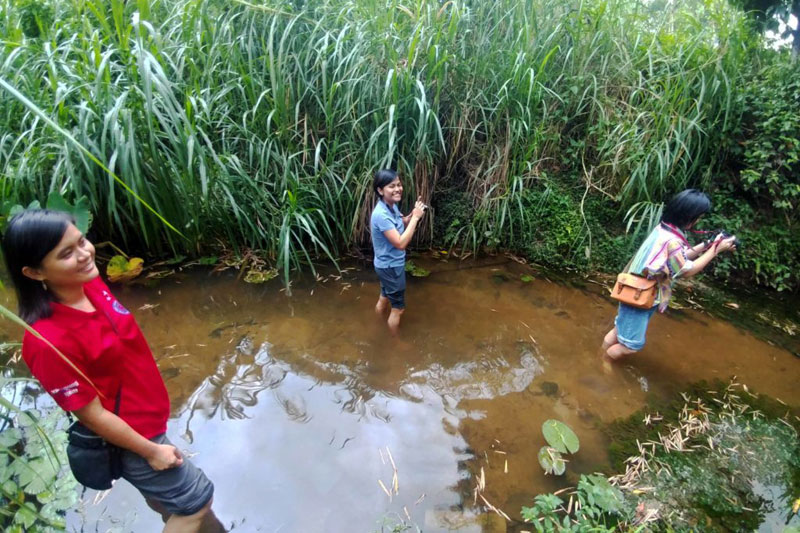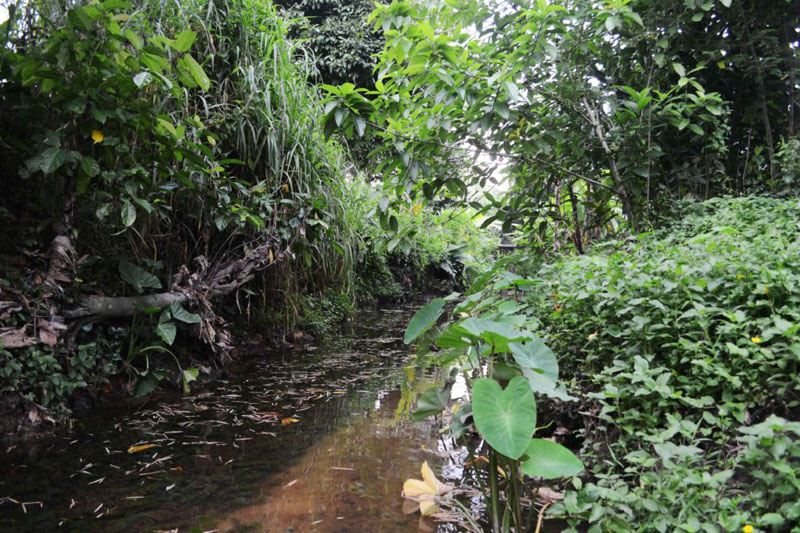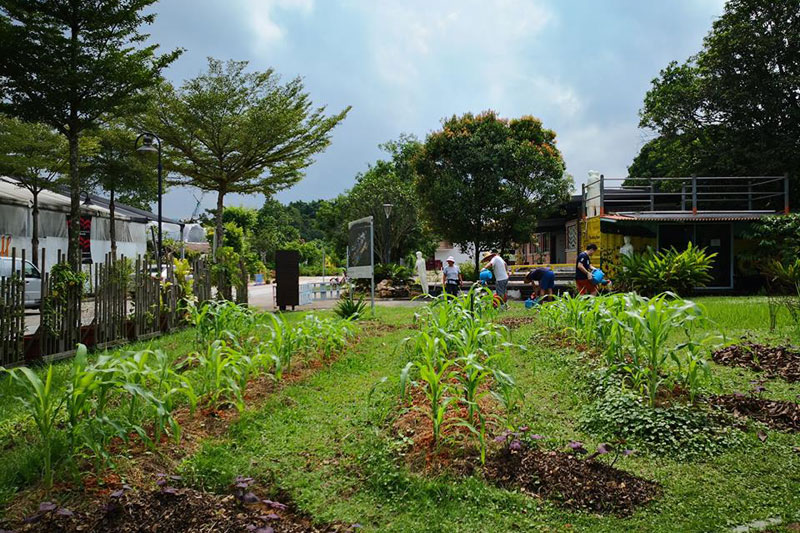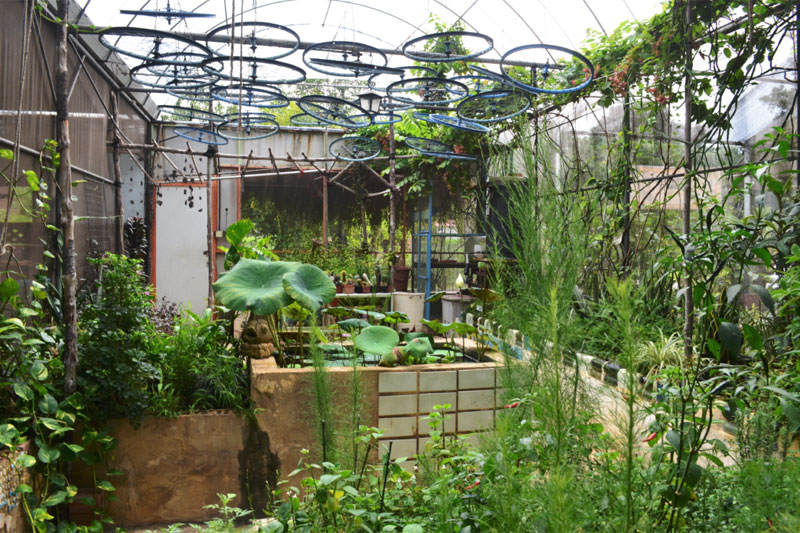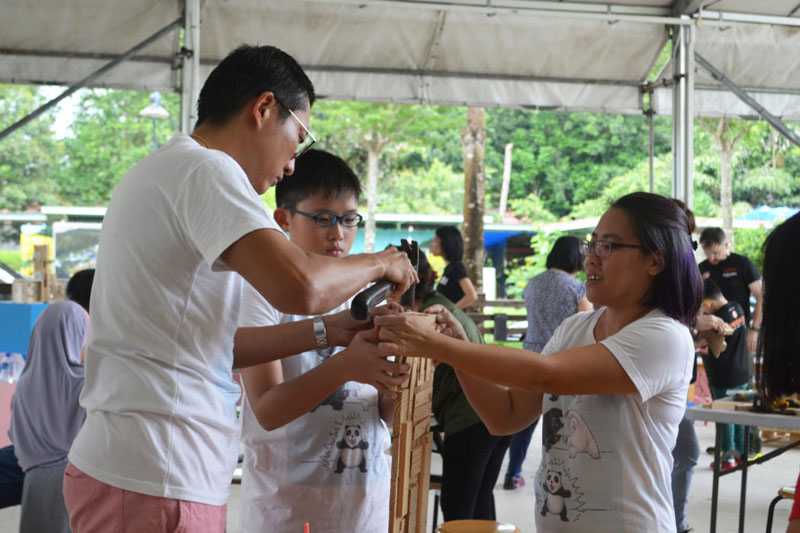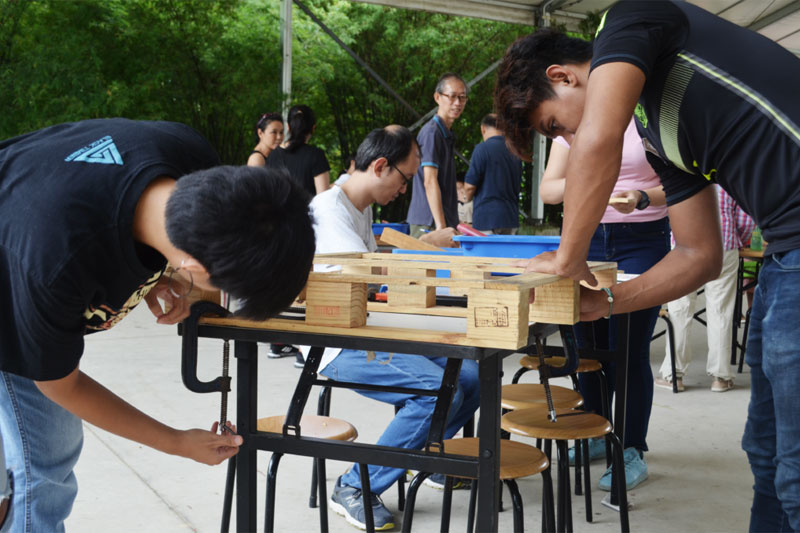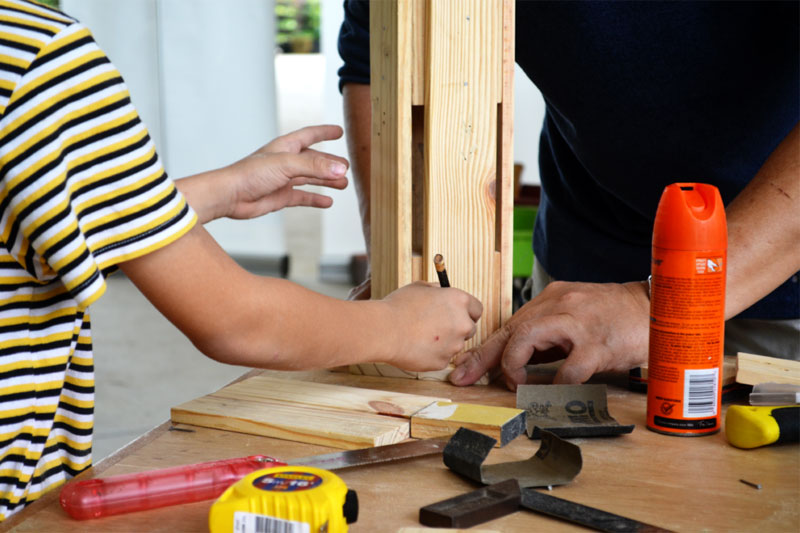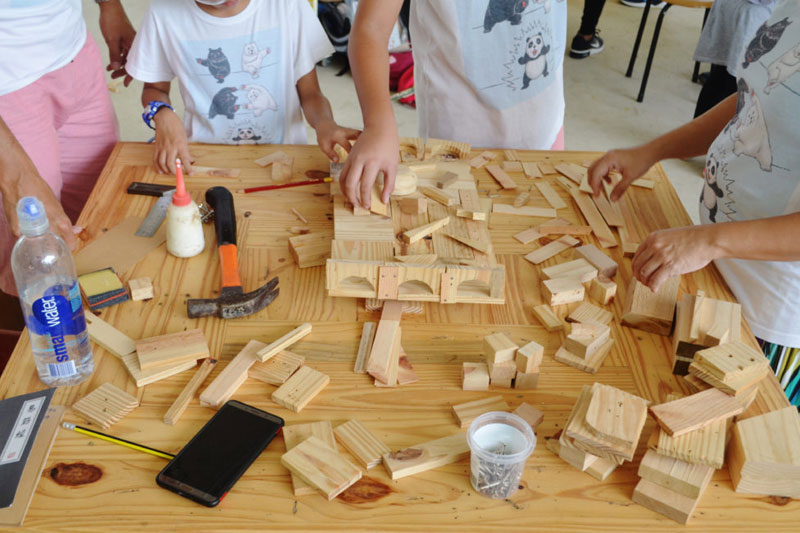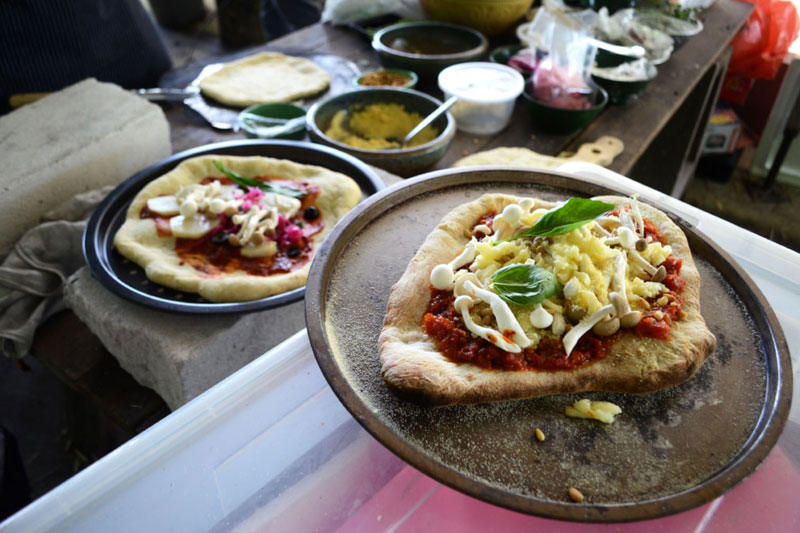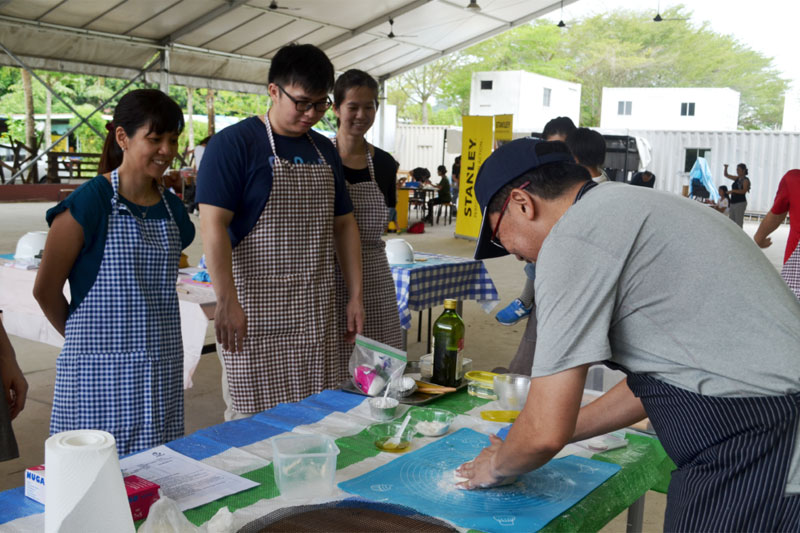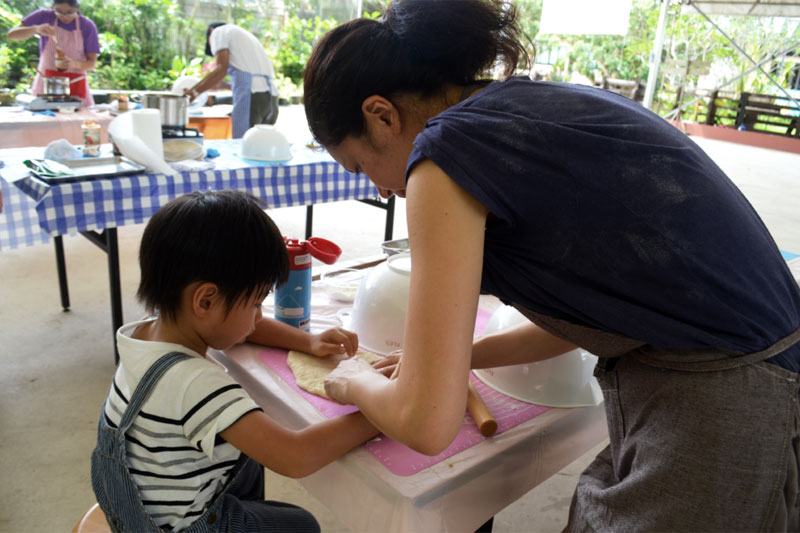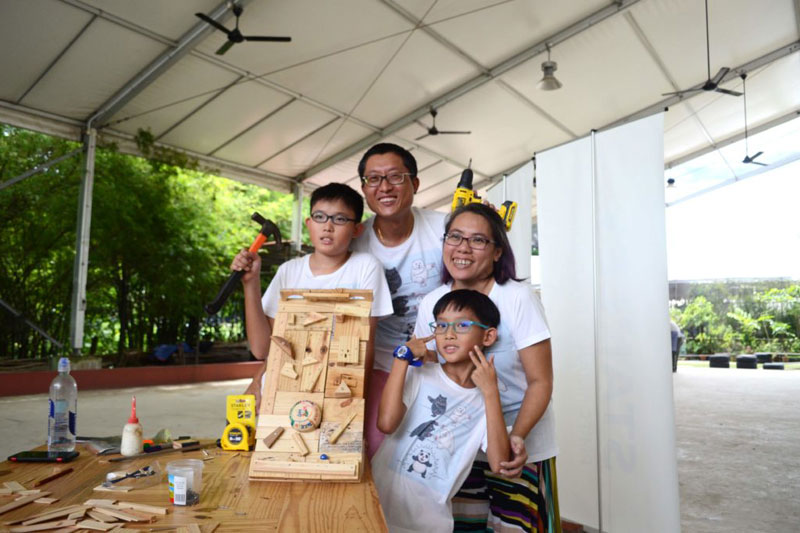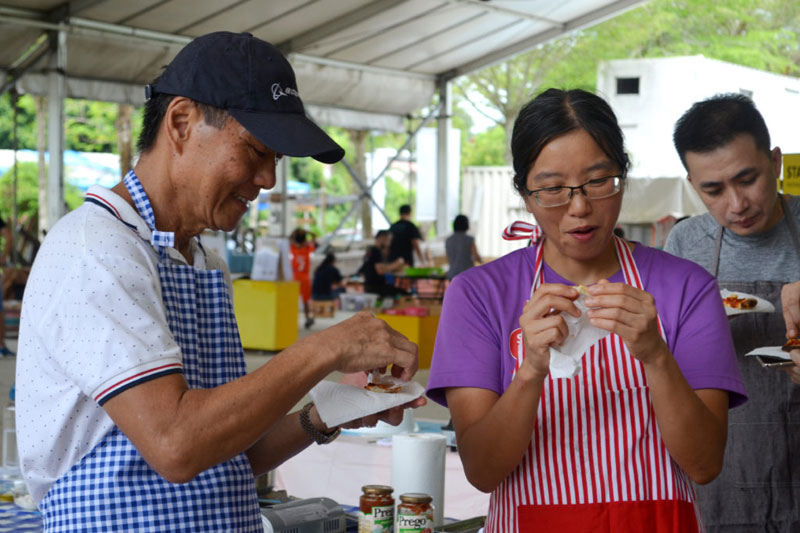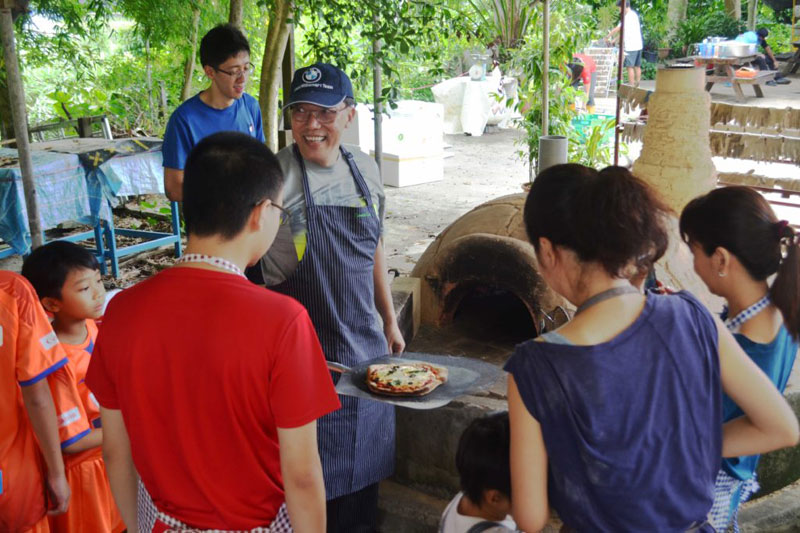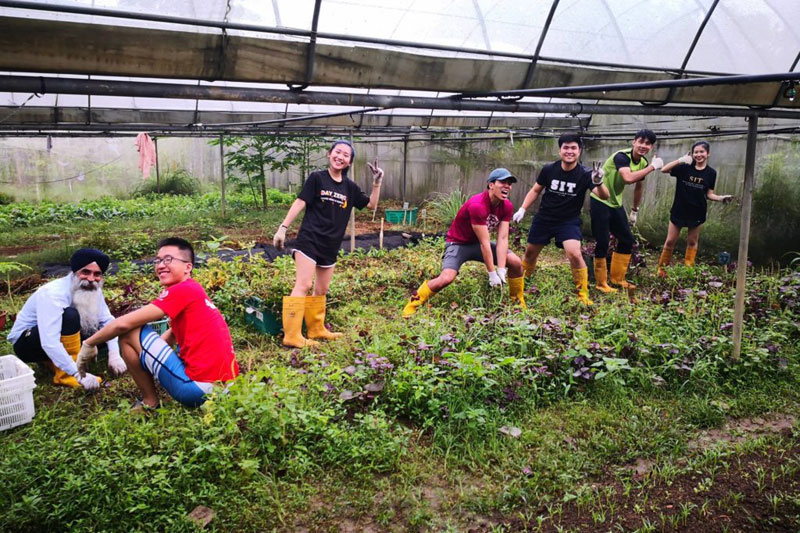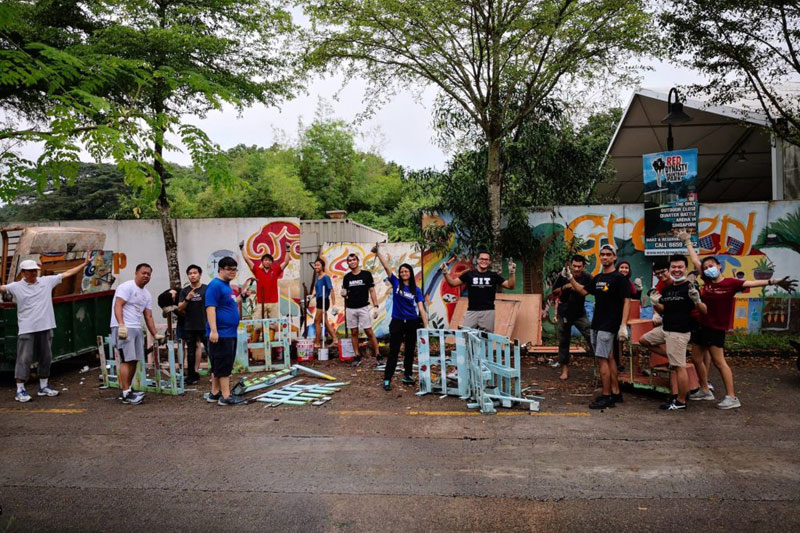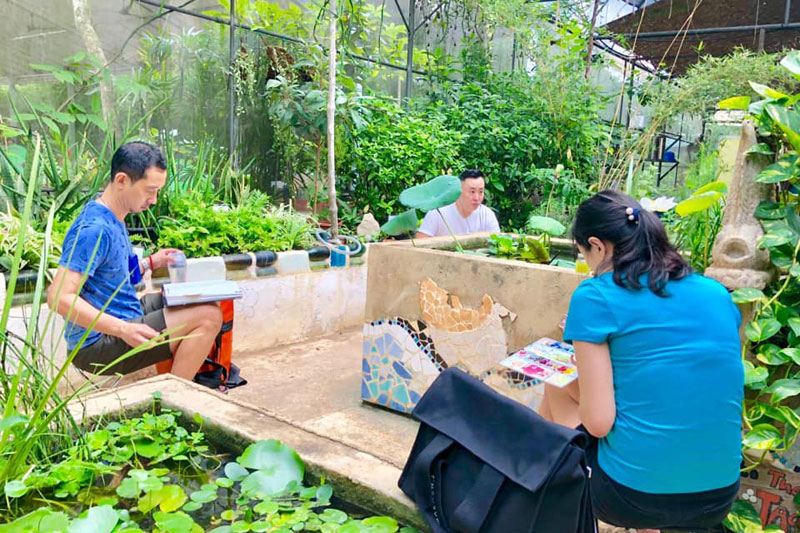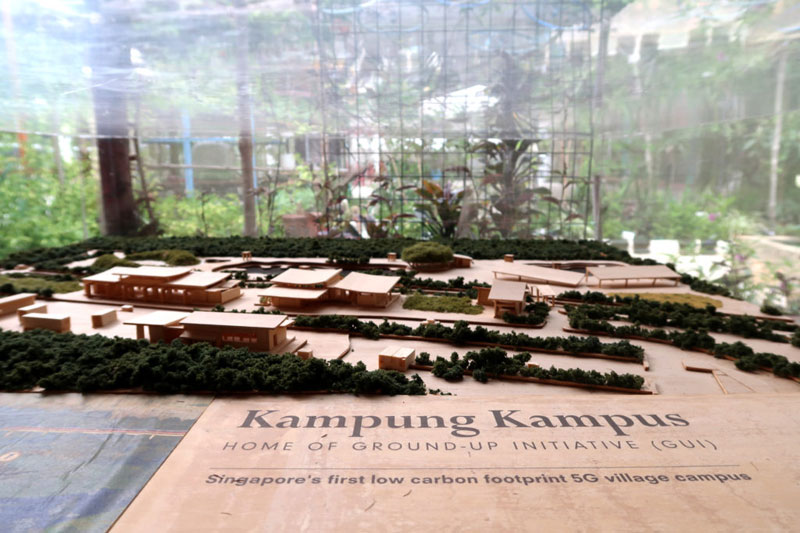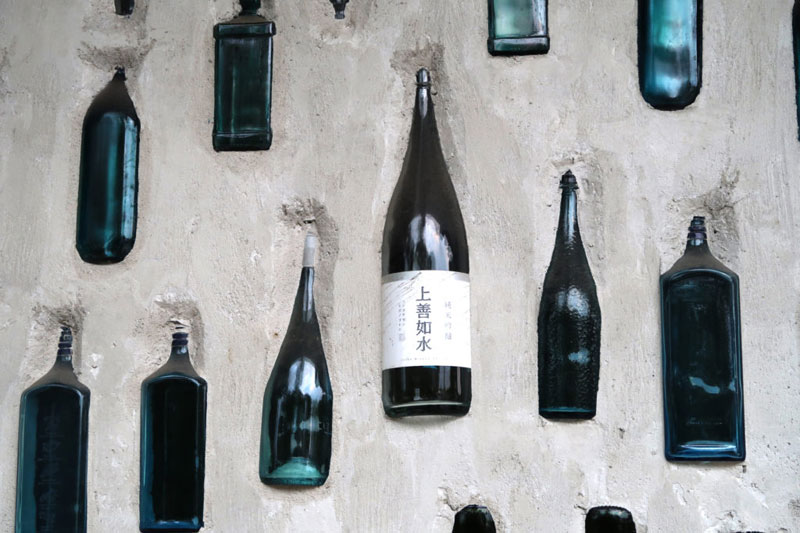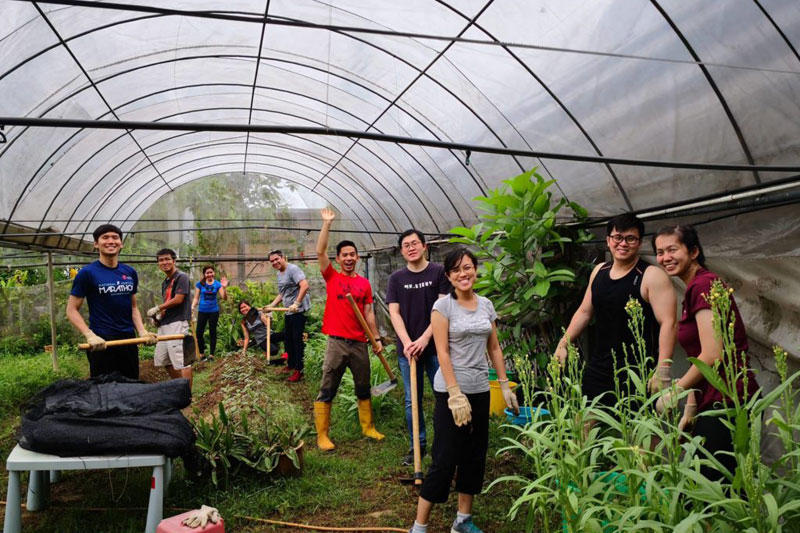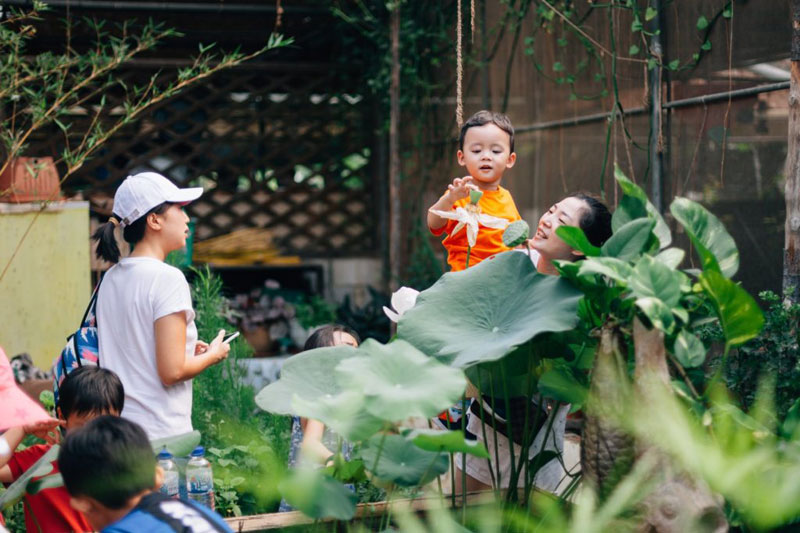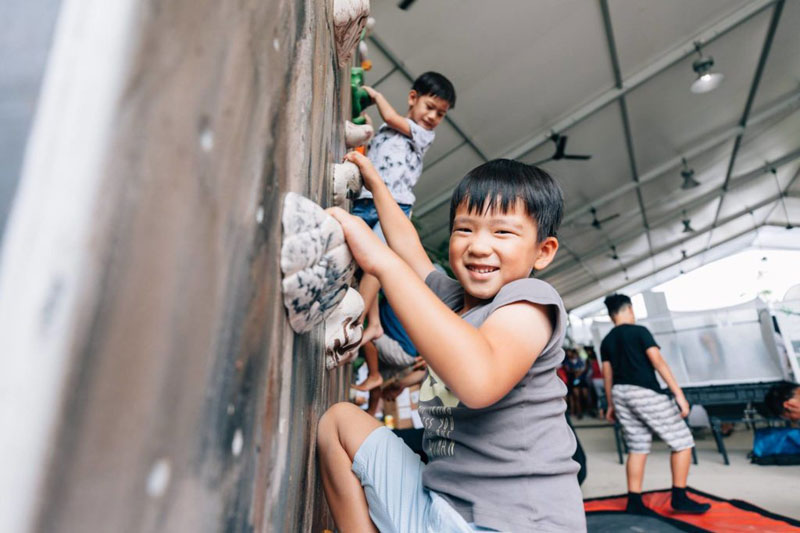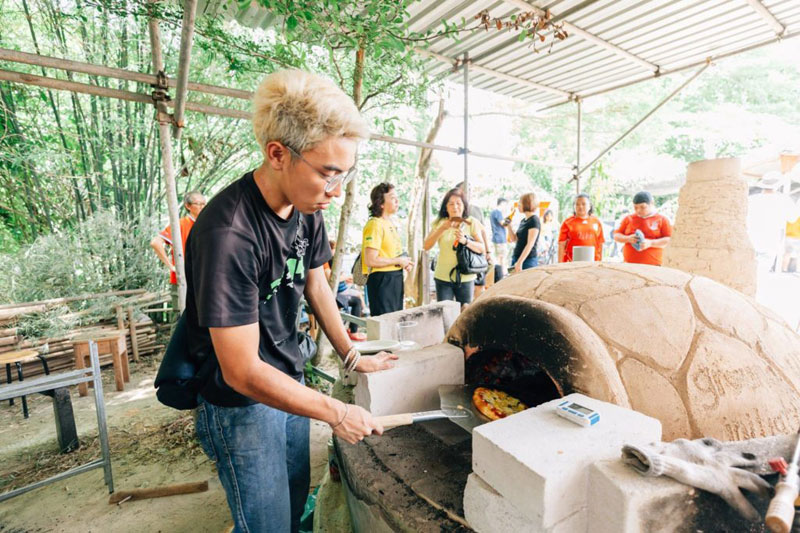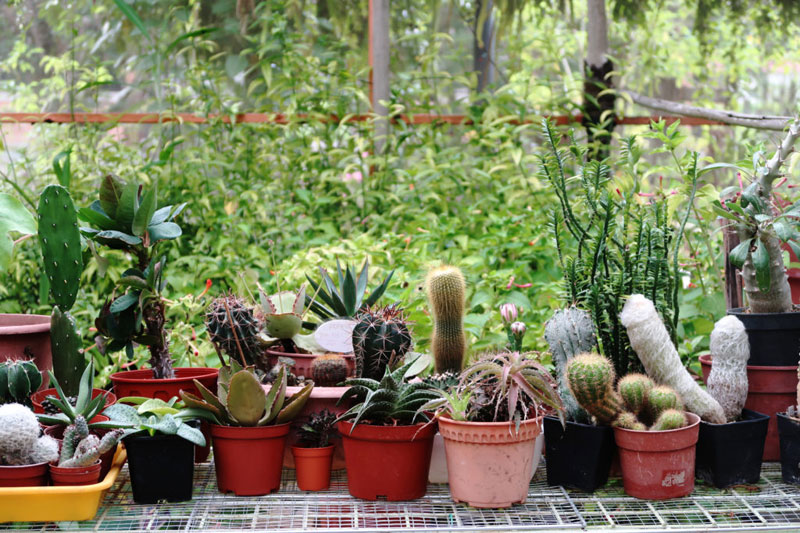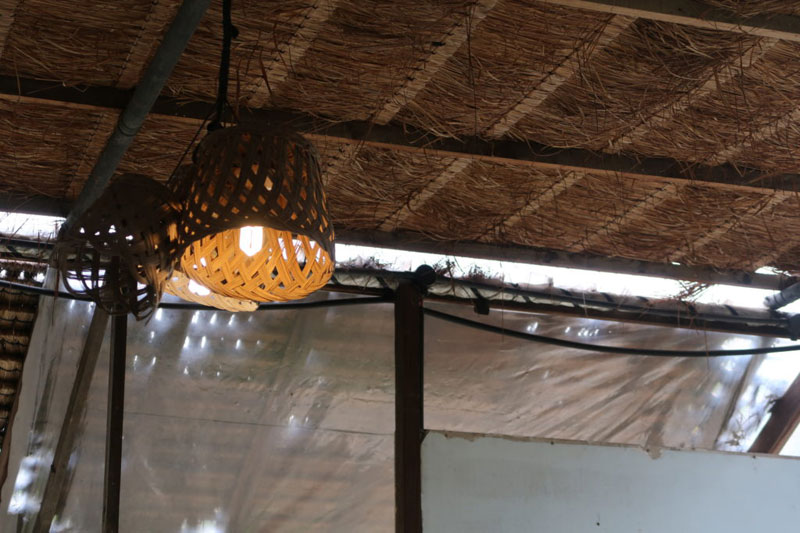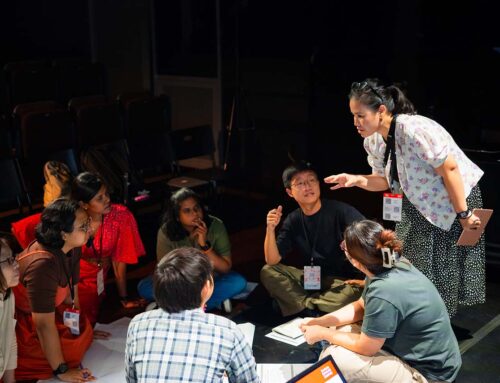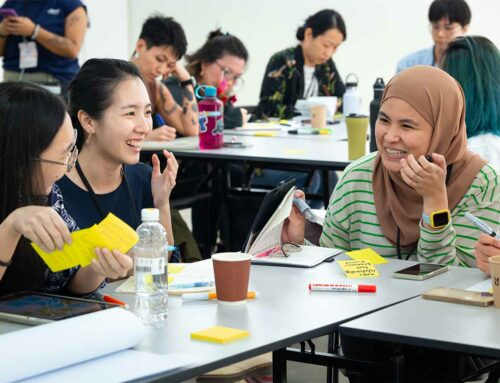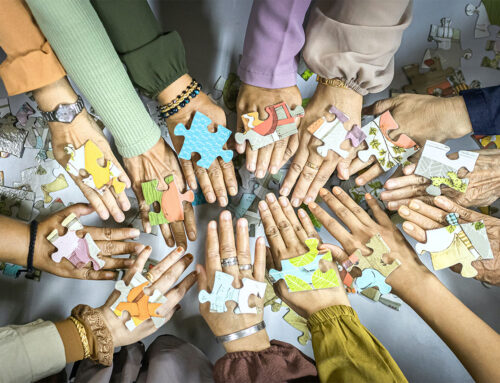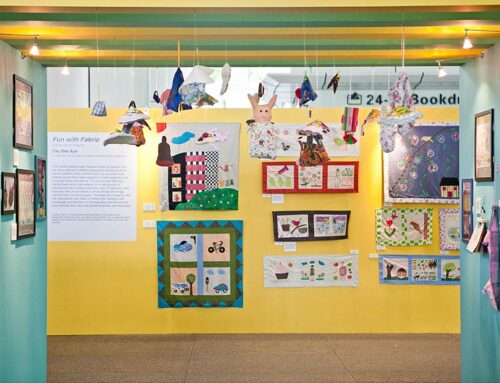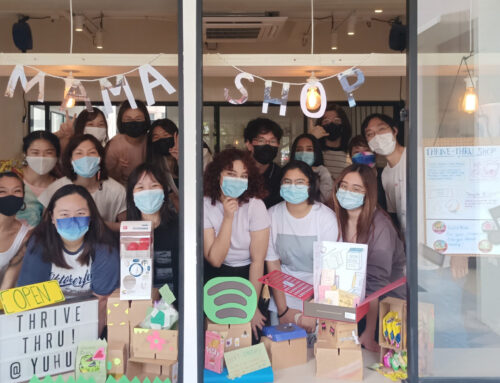“Do you guys want to go into the stream?”
Without hesitation, we took off our shoes, rolled up our trousers and treaded on a short mud path that led into a natural stream. With our feet at the bottom of one of the last remaining “earth drains” in Singapore, our tour of Ground-Up Initiative (GUI) continued. We would later go on the rest of our tour barefooted. I don’t think that anyone of us from ArtsWok quite expected that for our first trip to GUI. I’m not sure what made us so spontaneous or playful but that was the spirit that I have come to associate GUI with.
Imagine a place tucked away and nestled in luscious greenery. It is a counterpoint to the strident, uniform logic of concrete establishments. Picture multiple shelters and 1-2 storey buildings glossed with a homely haphazardness to them – wooden fences with raw edges and unevenness that could only be made by hand. There is also a mini plantation of crops interlaced with mud paths. Wherever you are, you can hear the birds and the movement of the leaves. The place is comfortable – its pulse and internal rhythm parallels a leisurely jaunt.
Doing, making and creating
“The act of creating and making means you get to decide. You play a stake in it”, said Hui Ying, Kampung Connector of GUI.
On a separate day, I had the opportunity to observe a woodworking jam and the Earth Oven Pizza Workshop. There were young people, children and families. Everyone was engrossed, absorbed in their own projects – sawing, glueing, drilling pieces of wood; rolling, flattening, kneading dough, and cooking individual concoctions of pizza sauce. GUI felt like a playground where there’s spontaneous and free play, charged with a certain openness towards the possibilities that can be done in the space.
The spirit of openness shows up evidently in the way the activities are conducted. Participants would hammer, saw and drill recycled wood to create projects of their own imagination and liking; others would take instruction from an instructor but could make their own adjustments to the recipe or mould their own odd, uniquely shaped pizza. Whatever it was, participants were present – doing, making and creating with their hands. In the act of making, one decided and took ownership of one’s own project – adapting and exploring new ways to approach problems and experimenting with one’s own solutions.
The logic of play – described as “a free activity quite consciously outside ’ordinary’ life… but at the same time absorbing the player intensely… [which] proceeds within its own proper boundaries of time and space according to fixed rules and in an orderly manner” – is evident in the way activities are designed at GUI.1 At GUI, the medium of play is grounded in nature – woodworking and natural farming. The 2.6 hectares plot of land is called Kampung Kampus, a low carbon footprint community campus that aims to be a role model in sustainable living and a “School of Life”. Whether the activity is woodworking, farming or cooking, participation involves decision-making, innovating and following through with decisions. Ultimately, GUI is the “practice zone” for people to exercise the muscle of experimenting, failing and trying again – which “leads to resilience over time”, said Hui Ying.
Ownership and rootedness
“’I have imagination. I have guts.’ I think that’s enough to start anything.” – Tay Lai Hock (from a video interview in 2016)
In many ways, the late founder Tay Lai Hock embodied the spirit of play and risk-taking when he first started GUI with a team of volunteers. Beginning with a 100-square meter space in 2009, GUI expanded over the years. Today, GUI is not “just a ground or plot of land. It’s a home. It’s the meaning of rootedness.” Lai Hock “felt the need to connect people to the land again” and wanted to demonstrate to Singaporeans that “a piece of land also has a social dimension, an educational dimension, a community dimension, and… a spiritual dimension.”
This spirit manifests in the programmes, providing people with the space to connect with nature freely, make decisions, and cultivate patience.
Building community and co-creating outcomes
Everyone loves having fun but amidst the fun, these open spaces of play and discovery has had the profound impact of nurturing a community of volunteers and participants.
Community can mean different things. Personally, for Hui Ying, “community means a shared experience”. It is about doing things together, like in Balik Kampung, the flagship programme where everyone comes together to do maintenance and “housekeeping”. For some of its members and volunteers, GUI models a way to live, connect with others, build community and contribute to the environment.2
The GUI community encompasses anyone from staff to volunteers to participants. Some began as volunteers who became facilitators or trainers for other programmes; others were participants who became volunteers; and in Hui Ying’s case, a volunteer who became a full-time staff. Besides being able to share experiences, what is also incredible is how the community at GUI plays a part in co-designing and co-creating GUI. Programmes are in part dependent on the initiative and assets of the volunteers, who have been behind programmes like Kampung Pilates, Kampung Sketching, Earth Oven Pizza Workshop, as well as tasks like cooking lunches for the community. In Hui Ying’s words, GUI is “diverse” and there is nothing “fixed about it”. She remarked that GUI is “a space for people to just be… open to anyone who wishes to do something. You can come here to talk, have lunch, volunteer.” It is a collective space for all, shaped by everyone who wants to have a stake.
Play anchored in values
The community at GUI wasn’t built overnight. Just as play happens within limits of time, space and rules, the free play of GUI is undergirded by particular “rules” – values and ethos different from the structures and logic of urban life. That distinctiveness from urbanity is what makes GUI out of the “ordinary” and a playful space.
These values permeate throughout the Kampus. It is in the built environment: in the hand-laid wooden paths, in the recycled glass bottles (integrated as part of the walls of the office space), in the love and appreciation of the things owned. It is in how programmes are run with openness, patience and heart. It is also in the people – staff, volunteers, participants – the programmes are organised with.
GUI brings the “hardware, software and heartware” together in their programmes – physical skills, soft skills and in particular, character development. While Singapore has the narrative of the 5Cs, GUI has a counter-narrative articulated as the 5Gs: Gracious, Green, Giving, Grounded and Grateful. With all the work that GUI is doing, one of the intentions is in nurturing people who will become leaders. The philosophy is premised on the belief in leading by doing. Hui Ying puts it beautifully: “when we go out, we do the work and we farm our own hearts. We call it thinker, warrior, farmer. In Chinese, it is called 能文,能武, 能动土“. GUI models the alternative way of being and leading, but inspires others to partake in the same journey. The values guide the limits within which individuals can play, and boundaries in which the community can innovate. In a way, the journey and evolution of GUI itself, with its own narrative of risk-taking and exploration, was anchored firmly on their values.
GUI and beyond
The current challenge in GUI is the running costs of the place, as well as the future of GUI after Apr 2020 should they fail to renew their lease. The uncertainty of the future brings to fore other questions: What could GUI look like without its existing space? How would the GUI’s model towards community building proliferate in other communities? These questions remain a “problem statement” for GUI. However, there have been initiatives that sought to bring the spirit of GUI and play into other communities. Kampung Play is one such programme that is brought out of GUI, where people would gather to make their own games through basic woodworking.
GUI is as much about its physical space as it is about the spirit that breathes through it. Should the lease renewal fall through, it might entail more experimentation of the model of community building as well as more risk-taking. Challenges will arise. Some of the conditions might change – a different space, a different context – but the values and ethos of GUI will probably not. I believe it is in approaching the new limits with a playful heart and spirit – trousers rolled up and feet bared – that new possibilities can emerge.
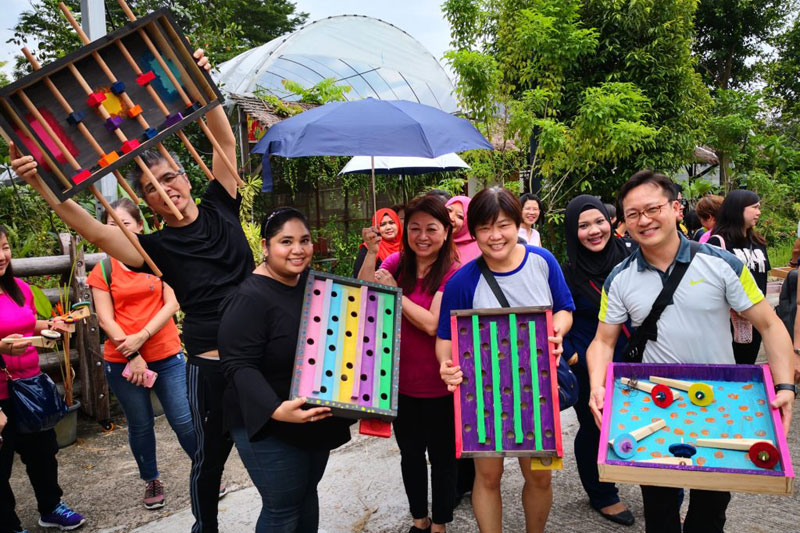
Participants of “Kampung Play”. Image courtesy of Ground-Up Initiative.
Images if not specified are by ArtsWok.
[1] Huizinga, Johan. (1955). Homo Ludens: A Study of the Play Element in Culture, Beacon Press: Boston, p13.
[2] The statement references quotes on GUI’s website at http://groundupinitiative.org
About Ground-Up Initiative
Ground-Up Initiative (GUI) is a non-profit organisation that involves and connects people with nature through natural farming and woodworking. We work to showcase the best practices in sustainable living for Singapore, and builds towards a 5G Nation by being Gracious, Green, Giving, Grounded and Grateful.
This season, GUI is trying to #KeepKampungAlive through a series of programmes and outreach. If you are seeking for meaningful CSR experiences and teambuilding, and unique spaces to run your own events, do see what GUI has to offer!
More about #KeepKampungAlive at www.groundupinitiative.org/keepkampungalive
About the writer
MICHELLE LIEW is a Programme Manager at ArtsWok Collaborative. She runs the programmes, The Greenhouse Sessions and The Greenhouse Lab; a community of practice, and action-learning programme respectively that focuses on arts-based community development. She also oversees communications for the organisation and is the editor for the bi-annual e-newsletter as well as case studies. She is energised and thrilled by opportunities that bring people and art together. What keeps her going is the belief that there is a unique virtue when the arts intersect with social causes.


